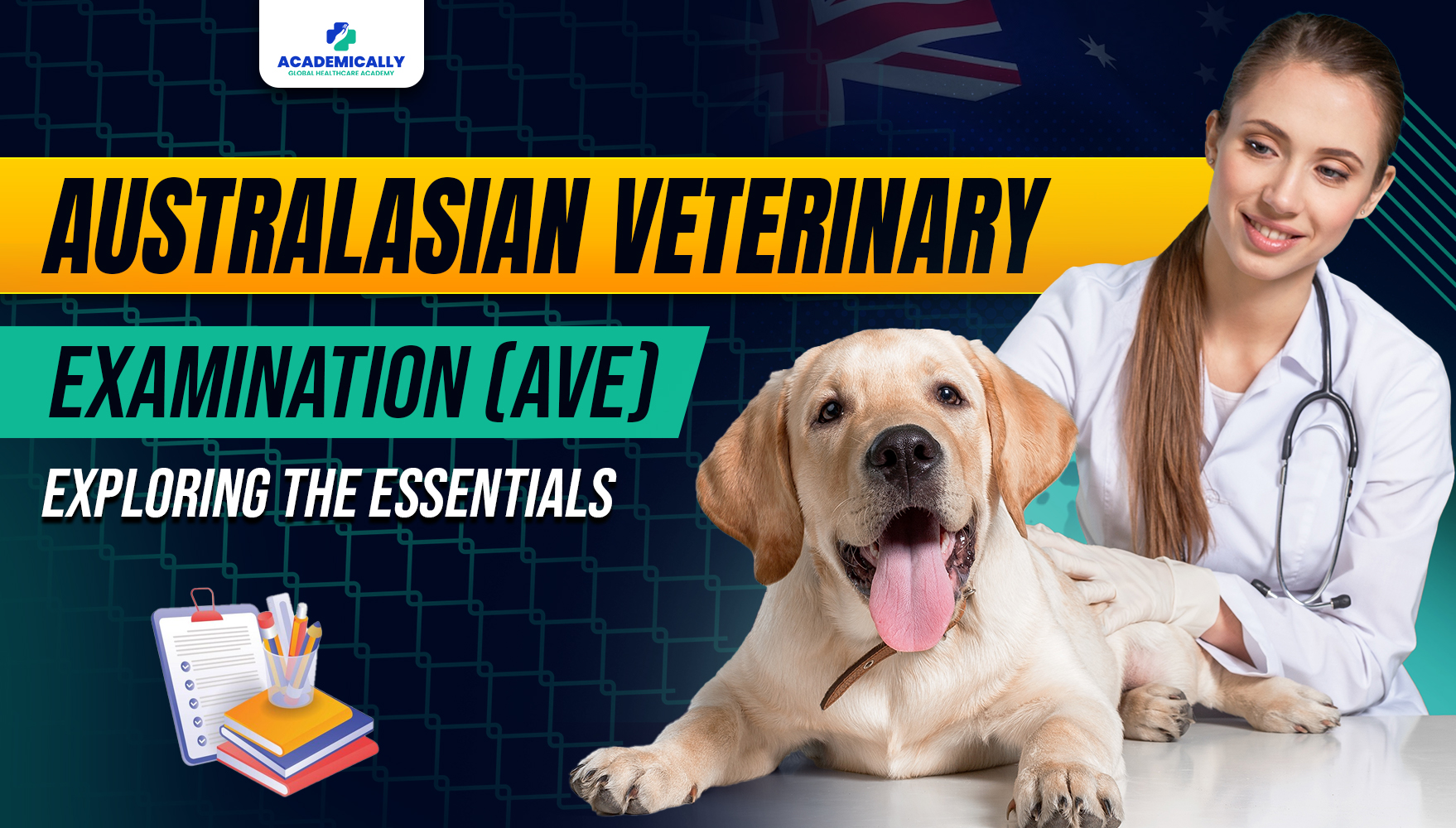Australasian Veterinary Examination (AVE)
The Australasian Veterinary Examination (AVE) is an assessment tool for overseas qualified veterinarians seeking registration in Australia or New Zealand. The AVE evaluates veterinarians' veterinary knowledge and clinical competencies to ensure they meet the standards required for registration in Australasia.
There are three steps in the AVE Process.
Step 1: Eligibility
To be eligible for the Australasian Veterinary Examination (AVE), you must first undergo the AVE Eligibility Assessment. This assessment ensures that you meet the following criteria:
Veterinary Qualification:
- After completing at least four years of study, you must possess a primary veterinary degree or diploma.
- Your veterinary school must be listed on the AVMA ECFVG-listed Veterinary Colleges of the World or affiliated with a college or university listed in the World List of Universities.
Veterinary Registration:
- You must be registered, licensed, or eligible to be recognised as a veterinarian in good standing in the country where you studied or worked.
English Language Ability:
- You must meet the AVBC English Language standards without any exceptions.
Step 2: Preliminary (Multiple Choice Question) Examination
The Preliminary (MCQ) Examination assesses candidates' understanding of veterinary science and its practical application in Australia and New Zealand. It comprises two papers:
- Paper 1: Tests general knowledge of veterinary science.
- Paper 2: Evaluates clinical reasoning and the ability to apply specific knowledge in clinical scenarios.
Administered via secure computer delivery, candidates can access a brief practice test upon enrollment. The examination typically takes place in April each year, with venues in various state capital cities of Australia and New Zealand and potentially in overseas locations.
Time Limit: You are allowed a maximum of three attempts at the Preliminary (MCQ) Examination. Failing the examination three times results in a mandatory two-year waiting period before being eligible for re-sitting. Additionally, candidates must undergo counselling with a member of the AVE Committee during this waiting period.
English Language Requirements
You must take the Preliminary (MCQ) Examination within three years of passing an English language test. If this validity period expires during the engagement with the AVE process, you may need to retake the English language test. Exceptions to this requirement may be granted under specific circumstances.
If failing the Preliminary (MCQ) Examination, candidates must retake both papers during their next attempt and still within the validity period of their English language test.
Step 3: Final (Clinical) Examination
The examination evaluates candidates' grasp of disease and animal management within Australasian conditions, ensuring readiness for effective veterinary practice in Australia or New Zealand. This involves making prompt, informed decisions regarding diagnostic steps, treatment plans, and control strategies based on provided case information. Candidates are expected to articulate and justify their decisions regarding diagnosis and treatment.
Furthermore, the examination assesses practical skills, including animal handling and basic surgical procedures. Proficiency in clinical deduction, problem-solving, and fundamental clinical procedures is imperative for satisfactory performance in this examination.
The Final (Clinical) Examination, held over five days at an Australian veterinary school (currently the University of Queensland), typically takes place in November. Occasionally, an additional examination session may be offered mid-year, depending on the discretion of AVEC and demand.
Time Limit: Candidates must undertake the Final (Clinical) Examination within a maximum of three years from passing the Preliminary (MCQ) Examination.
English Language Requirements
You must ensure that the English language test result remains valid when taking the Final (Clinical) Examination. If the validity expires, you can renew the validity by retaking the test according to current standards. However, the need to retake an English language test may be waived under specific circumstances.
Examination Fees
The examination process for veterinary professionals in Australia involves several fees. Here are the main fees for the AVE Examination:
Type | Fees in AUD |
| AVE Eligibility Assessment | 480 |
| Preliminary (MCQ) Examination | 3220 |
| Final (Clinical) Examination | 8700 |
Veterinarian Registration in Australia
Upon completing the AVE and obtaining the Certificate in Veterinary Science, you can apply for complete registration as a veterinarian in any State or Territory in Australia or New Zealand.
This Certificate serves as proof of their qualifications and competency, which they must present to the respective Veterinary Board in their chosen location for registration.
Once registered, veterinarians hold the same rights and responsibilities as all other registered practitioners in Australia or New Zealand, allowing them to practice veterinary medicine with full privileges and obligations.
Benefits of becoming a Veterinarian in Australia
Becoming a veterinarian in Australia has many benefits, making it a rewarding and fulfilling career choice. Here are some of the key advantages:
Diverse Work Opportunities: As a veterinarian in Australia, you can access many career opportunities, including private practice, government agencies, research institutions, zoos, wildlife sanctuaries, and more. This diversity allows you to explore various fields within veterinary medicine and pursue your specific interests.
High Demand: Australia has a high demand for skilled veterinarians, particularly in rural and regional areas with a shortage of veterinary services. This demand translates to ample job opportunities and potential for career advancement.
Competitive Salaries: Veterinarians in Australia enjoy competitive salaries, with earning potential increasing based on experience, specialisation, and location. The Australian veterinary industry offers attractive remuneration packages, making it financially rewarding for professionals in the field.
Work-Life Balance: Australia is renowned for its emphasis on work-life balance, with a strong culture of leisure and outdoor activities. As a veterinarian, you can enjoy a fulfilling career while still having time to pursue personal interests and activities outside of work.
Professional Development Opportunities: Australia offers numerous opportunities for professional development and continuing education in veterinary medicine. From conferences and workshops to postgraduate studies and research opportunities, veterinarians can access resources supporting their ongoing learning and skill enhancement.
Quality of Life: Australia is renowned for its high standard of living, excellent healthcare system, and beautiful natural landscapes. Whether you prefer coastal living, urban environments, or rural settings, Australia offers diverse lifestyle options to suit your preferences.
In Closing
The Australasian Veterinary Examination (AVE) is a comprehensive assessment tool designed to evaluate aspiring veterinary professionals' essential knowledge and skills in the Australasian region.
As the field of veterinary medicine continues to evolve and expand, the AVE remains a vital instrument in maintaining the highest levels of competence and proficiency among veterinarians, ultimately contributing to the health and well-being of animals across Australasia and beyond.
If you are aspiring to become a veterinarian in Australia, join Academically. We have a tailor-made - AVE Exam Preparation Course to pass the AVE in a single attempt.
Fill up this form for a free one on one counselling session.





